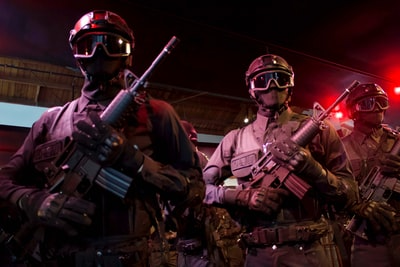This is a re-post Chet Richard’s review and the book author’s responses to his observations and analysis. stands on its own two feet and needs no additional context or explanation. The original is viewable on his website Slightly East of West. That said, this post you’re looking at now is more than a reprint. I’ve split up the original review to highlight each of his observations, and respond to them. I offer sincere thanks to everyone who’s read and commented on the content we’ve posted on Fabius Maximus over the years, and I hope you find this new column informative, or at least entertaining.
Introduction
The day my new book Ultra Violence went live on Amazon, I asked Air Force Col. (Ret.) Chet Richards if he would mind writing a quick blurb about the novel. Chet Richards is someone I happened to be able to correspond with through (the good kind) of randomness that so often dictates how humans bump into each other during our brief existence on Earth. Not only did he write a review, he wrote one that same day. Chet even penned two versions; an appropriately brief one on the book’s Amazon page, and a longer version on his website, . That was a kind thing of him to do, both for me and any prospective readers of my book. I encourage everyone to pause before clicking that “purchase” button, and take a few minutes to read what he took valuable time to wrote. This review is a well-crafted commentary that’s lean and straight to the point. For me as the author, when I read it, I didn’t even feel like I was looking at a review. It’s no different than the drip-feed of constructive criticism he gave while reading through the original Ultra Violence weekly anthology series on Fabius Maximus. Everyone who happens across his commentary on Ultra Violence should realize that too. It’s useful and smartly written observations and analysis, not a fluff piece.
I want reviews that are useful to the prospective reader, and here’s why
Before diving into Chet Richard’s analysis and my responses to what he said, I would like everyone to pause for a moment and ponder the nature of reviews in our digital world; not just book reviews, but reviews of products irrespective of industry.
I think carefully before asking someone to write a review of my work, and I approach the matter trying to think as I would on the other side of the equation as the reader. Buying a book is an investment, and I don’t mean that in terms of the few dollars to purchase an ebook. As someone who buys books frequently, I rarely consider the price of what I buy. With few exceptions, ebooks and print-on-demand paperbacks just aren’t expensive. Wasting a few dollars is no more torturous than any other first world problem. It’s a minor annoyance. Especially people like me who are spontaneous hoarders. I impulsively buy random things that just end up taking up space in the house, so am hardly in the position to complain about wasted money. That’s not what I mean by investment. I’m referring to something far more important than money; time.
Wasted money is quickly forgotten, but people will rarely forget, or forgive, a waste of their time. A few hours spent wading into a book that turns out to be uninteresting is a few hours wasted. That reader trusted an author with his time and lost time instead. That reader could have done something else with those lost hours. He could have read something he liked. He could have walked the dogs. He could have counted cracks on the ceiling. Instead, the disappointed reader tried to slog his way through a book that, for whatever reason, wasn’t right for him. That’s why reviews are important.

Sadly, decent reviews are also tough to come by. In an increasingly hectic gig economy over-saturated with artists and creators in almost every field and industry, and proportionally saturated by marketing companies hoping to latch onto however many anxious artists they can, all too many reviews aren’t proper reviews at all. An increasing percentage of web and print pieces dressed up as reviews are actually paid promotions. They’re usually not even well-constructed ones. A “review” that heralds a book with absurd over-enthusiasm like it’s an updated edition of the Bible written by Christ itself… that’s an advertisement the author himself or his agent/publisher bought and is about as useful as… any other paid promotion. Not useful at all.
On the flip side of the coin, a review that makes the author’s book sound as horrible as Mein Kampf except also poorly written, then that’s more likely than not a shameless hit piece. It’s the polar opposite of a fair review and any meaningful information the reader gleans from the self-declared genius’s vomit of edgy drivel is only there by accident. It’s a cheap but common tactic for commentators to be contrarian and unfairly negative. For the lazy writer, zeroing in on a book that people like and beating it up in a trashy clickbait article is easier than actually finding something original and useful to say. In fairness, commentators are in a struggling industry and have to do everything humanly possible to push a high volume of content that draws as many views and clicks as possible. Sad violin music aside, this brand of work is still as useless as the sponsored fluff pieces.
Thanks to those two categories of drivel, it’s getting noticeably more difficult for me to dig past the garbage for what I actually want; something to help me as a prospective customer make an informed decision.
Chet Richards’ take as the reader of Ultra Violence; in his words
Chet: Back earlier this year, author Ian Michael serialized his new novel, Ultra Violence (Tales from Venus, Book 1), on the Fabius Maximus web site. His book is now out on Amazon, and if you’re at all a fan of alternative universe fiction — think Charles Stross or J. D. Horn (doesn’t have to be sci fi) — take a look at Michael’s new book. In coming years, you can say you helped discover him.
This is a satisfying first novel in the alternative universe genre. The key to making such stories successful is that the alternative universe has to be logically consistent, given its ground rules, and all the characters must behave according to those rules. Otherwise, the author can dig themselves out of any predicament with a bit of magic. And after a while, who cares?
So imagine a universe pretty much like our own up until the mid 20th century. It’s somewhat more technologically advanced than ours, though. There are the same two political blocs, one in the East centered on the Soviet Union and Chinese, and one in the West around NATO. Each bloc has staked out and colonized one of the two nearest planets. The East went to Mars and the West to Venus. After suitable terraforming, citizens of each bloc stream to their respective colonies: “Terrans grew tired of their hellish lives in overcrowded, crime-ridden hive cities. They flooded to the other two planets, building powerful nations in their own right.”
Ian Michael: The writing style, rules and logic that I follow in my short stories and novelizations like Ultra Violence are a little unusual. Actually, they’re highly unusual, but they’re the end result of a lot of careful thought. What does my personal writing framework look like? Now many, I’m guessing the vast majority, of readers won’t care, but this is important information for anyone who is considering a purchase of Ultra Violence, and why I’m sharing it here. I developed a style that I enjoy using and can employ effectively, and I believe will convey my stories and messaging in the most concise and pleasing way, but no writing style is so good that it can please everyone on Earth.
I spent years playing around with all types of exposition. In the end, I decided to just stick with what I’m familiar and well-practiced in applying. I have a journalistic education and career experience, and mainstream print journalists almost always use AP Style formatting and conventions for their articles and feature stories. I saw no reason to not simply use that. Honestly, is a news article and a fictional story so different from one another? One is real life and the other is made up nonsense (Depending on the reporter, maybe both are made-up nonsense, heh). Besides that, they weren’t written much differently. So Ultra Violence became AP Style.
Or more accurately, it is modified AP Style. It didn’t take long for me to realize that not everything mandated by AP quite works in a novel, so I made minor tweaks as needed. With the exception of journalists, nobody is going to care about the details about AP Style. So I’ll boil it down to this one summarization that is important to know. People have different tastes in how a story is written. I write in third person limited perspective… in the present tense. The only time I write in the past tense is when describing a scene that literally happened in the past in relation to the current moment in time of the story. The vast majority of English language fiction, regardless of time period, was and continues to be written in the past tense.

Breaking away from the most commonly accepted convention comes with the risk of failing to keep readers immersed. However, that is a complaint none of the readers on Fabius Maximus expressed, and none of my friends I conned, I mean asked, to be test readers had an issue with the tense either. I’m not close to knowledgeable enough to even pretend at making any forecasts about the future, but I do believe this style of writing in the realm of fiction will become more common over time. I can go at length on this topic, including the way the human brain itself has been shaped by the media we consume. I’m influenced by the screenplay format of storytelling seen in virtually all video media, and so are the vast majority of my readers. I don’t think being heavily influenced by a screenplay format in a print story is some earth-shattering innovation.
I have yet to hear a single reader on Fabius Maximus remark on this similiarity, and I’m not surprised. The typical reader either doesn’t notice the conventions I’m using, or does notice but it’s too insignificant to bring up. Yes, the sky is blue but that’s not a breath-taking revelation. I use these conventions because they’re efffective, but that doesn’t make me a genius and what I’m doing is not groundbreaking. It’s just a little twist on industrty standard. Screenplay-influenced styles of describing people’s thoughts, dialogue, and action are all around us; too common to be noteworthy. It might have been noteworthy 50 years ago. Maybe 30 years ago. But not now.
CR: Like children everywhere, the colonies began to act increasingly independently of their mother planet. So now, instead of two superpower blocks in mutually assured deterrence, humans are faced with a situation of three actors, each suspicious of the other two and all armed to the teeth with the most destructive weapons their advanced technologies would allow. A fundamentally unstable situation. And then the Venusians discover what they think will be a counter to even the most advanced weapons of the other sides: People. Ultraviolent people.

The action begins.
IM: I hope people feel a sense of familiarity right from the opening pages of Ultra Violence, yet also feel like they’ve never seen anything quite like it either. As Chet spotted right away, the fictional universe I described is similar to ours, but diverged in the mid-20th Century. The divergence is deliberate, and not an original idea. This alternate timeline is almost play-by-play how people envisioned space colonization to be like right from when the first person thought up such a notion. People of past generations right up until within the last 80 years ago had the blessing of letting their imaginations run wild without the disillusionment of pesky scientists going around and making everything boring. Colonize Venus? Why not! It’s just another planet that’s a little warming. That’s a feasible thing to do. Colonize Mars! Turn the Martian moon of Phobos into a titanium-plated orbital defense fortress. Do anything and everything!
But there is a negative to every positive. In Ultra Violence, people’s worst fears from the Cold War era came true. Overpopulation was an obvious problem for me to appropriate, and also a convenient explanation for the endless surge of colonists to the colonies on Mars and Venus. The most severe problem of this alternate timeline is how the Cold War unfolded. In our world, we got lucky. The confrontation met a high point and simmered down, eventually ending with the pop of regime change in the Eastern world. Heck of a lot better than the nuclear bang of armageddon, but not a cause for celebration either. Total political and economic collapse isn’t fun for people unlucky enough to be living in the middle of it.
Any time a big, powerful country fragments into small, weak countries, that isn’t good. No matter how flawed the former empire, it was better than the abject poverty and continuous instability that is inherent with tiny slivers of land broken apart by tribal, ethnic and religious divisions. Anyone who thinks otherwise should ponder this: break up the USA into 50 little states. Some larger states like California and Texas would scrape by, but the weaker states without the economic firepower and natural resources to be self-sufficient would collapse into third world status overnight. Even the states with the clout to get by as new nations would be in a precarious spot. For example, things would be dandy in California… up until the next wildfire season. That happens every year, but would be a very different and more unpleasant story without manpower, equipment, funding and other rsources streaming in from all over the country. California would share the same fate as Ukraine, Belarus, or any other former SSR that now has to face overwhelming crisises on their own. It’s total chaos.

In the fictional world I set this adventure in, relationships between the USSR and Maoist China didn’t fall apart. The Soviet Economy didn’t collapse. This of course is fantasy, but not unbelievable. The USSR was in a strong position to continue developing their economy in a logical direction. Stalin, as brutal as he was, and as much as he deteriorated in his later years, did make clear attempts to make things easy for whoever succeeded him. He wrote a lot… in way, he spelled out what he wanted to do in the years following his death in extreme detail. His attitude suggests that he had a nagging feeling that everyone following in his footsteps would be idiots. If that is indeed what he thought, he wasn’t wrong. Now let’s imagine if the Soviets didn’t get kneecapped by a parade incompetent and corrupt leaders one after the other. Economic strength in the East combined with a space age that started and developed exponentially more rapidly than in our world, it’s not unreasonable to imagine the Cold War would not only fail to end, it would escalate and poison everything that mankind touched. No matter how far across the solar system explorers and pioneers try to escape, the sinful nature of man would accompany them everywhere like plague-infected rats in the cargo hold of a ship.
I take inspiration from my favorite authors from the golden age of science fiction and immediately after it. I don’t say “standing on the shoulders of giants” because that implies that I’m a giant too waiting for an apprentice to come stand on my shoulders too. Even if I was a genius author like Heinlein, Asimov, Drake, and others like them, I don’t like the shoulder-standing thing. people are heavy and I didn’t sign up to take Atlas’s job.
Ultra Violence has dashes of Robert Heinlein, but what doesn’t have dashes of Heinlein these days? Finding human elements of science fiction untouched by Heinlein’s contributions to the genre is about as easy as a car that works without wheels. But there were two specific authors I had in mind the most as I wrote this book. The first author I had in mind, particularly in the opening chapters of the book, was David Drake, the veteran tanker most famous for his Hammer’s Slammers series. Later sections of the book I thought of Harlan Ellison, who wrote A Boy and His Dog, inspired the Terminator series, contributed to Babylon 5, among other things. I won’t spoil why exactly I singled out Drake and Ellison specifically, but my reasoning should become apparent to any reader familiar with those authors while progressing through Ultra Violence.
When I thought up the first vague inklings of my tale, I put myself in the shoes of one of the blind mice touching the elephant. I decided to take an old familiar theme in fiction and throw a whole new twist into it, taking an idea on the brink of being an exhausted cliche and giving it new life. What does that have to do with blind mice? Here’s how. Anyone who is well-read in the genre of military science fiction is probably familiar with the concept of super soldiers. This reader might also be getting tired of hearing about yet another darn group of super soldiers. They’re better than everyone else and spend the entire story killing everybody without even breaking a sweat? Yawn. That’s how the mouse touching the elephant’s tail probably feels after several hours of that.
So change it up. Put him in front of the elephant’s trunk. Now our squeaky friend has something entirely new to explore. Even though he’s facing the same animal, the mouse is embarking on a whole new experience. Maybe that’s how the reader will feel. Or maybe he won’t. But that’s how I felt when writing this. I see a good book as an adventure while writing it, and a key part of that is finding a way to make it unique and original. Otherwise, I would get bored before even finishing the first chapter. I would have as many unfinished books as I have unfinished degrees in random fields. Wait, I do have as many. But I swear that I’ll finish ’em. I got one done and out the door, right?
The evil commies colonizing Mars and freedom-loving good people of the West colonizing Venus wasn’t an accident on my part either. Contemplate it… communists from the USSR and China. The Red Menace. The Red Planet. Get it? Commie Reds, Red planet? Well, I thought it was funny. To be clear, I am not motivated (or at least completely motivated) by silly puns, and there were real military and storytelling reasons for this geographical arrangement. However, for that hamster wheel spinning between my ears, that silly Red Planet private gag elevated a world-building concept from a mere good idea to absolute necessity. I do that over and over and just can’t help myself. In this same portion of the story, I made a borderline juvenile joke that involved the spelling of “gorillas.” I’m providing no more details than that. Just read and find that passage for yourself. It’s rib-cracking humor. Trust me.
As much as I would love to keep blabbering, I’ll stop myself before I spoil my own book.

CR: Without giving too much away, let me just say that Michael soon switches focus from grand strategy down to a small group of Venusians who find themselves caught in his scenario. This is, of course, a common technique — to get you emotionally invested in the people involved, and ask yourself what you would do, by putting you in with a bunch of characters that you come to care about doing things that you would care about if you were there.
I think you’ll enjoy how Michael’s develops his motley crew as the story moves along and perhaps agree that although you might not have done what they did, what they did do was logical and consistent with the ground rules of their universe. In the process, he tells a tale that kept me turning the pages. And since their universe isn’t too different from our own, there might be something for us to ponder, too.
I’m looking forward to more from Ian Michael!
IM: I fell into writing this way without thinking about it, and that may be partly because due to my background as a military public affairs specialist. That’s a fancy way of saying a combat correspondent. Think Joker in Kubrick’s Full Metal Jacket. That’s what I do. I cite this movie reference out of resignation because that’s practically the first words out of soldiers’ mouths when I introduce myself. No honest journalist manipulates people into saying things they don’t believe, twists quotes out of context or tells lies about things the interviewee never said.
That format influenced the logic of my madness when I branched off into fiction. At the beginning of a new story, I conjure up a vague concept of a person and start him along his path. As he hits various situations I have to take a step back and let him figure it out on his own without me forcing it. After months of writing chapter after chapter, it’s pretty easy to type out his actions since by then I know him down to his most subtle personal quirks.
Part of the reason I try so hard in this aspect of storytelling is that it is a huge pet peeve of mine to watch a movie or read a book and seeing a character do something so unnatural it’s immersion-breaking for me as a member of the audience. Writers do this all the time in virtually every medium of fiction, and as far as I can tell, almost always for the same reasons. The most common situation that causes a writer to lean on this crutch is when he paints himself into a corner. He wants the plot to go left but all the characters in the room would obviously go right. The writer knows it and the audience knows it.

Oftentimes the only way out of this mess is to just accept that the thing you wanted to happen can’t. Another workable solution, though it’s equally or even more difficult, is time travel. I don’t mean literal time travel magical free from consequences. That’s another crutch that gets used all the time and is possibly the worst crutch in existence. Case in point: the Marvel movie Endgame when the writers realized that Infinity Wars had put their protagonists in a position so impossible to solve in a plausible way. Jack Kirby himself wouldn’t be able to fix it. Infinity Wars is the movie equivalent of playing a chess game until you’re down to a king and two pawns, outnumbered ten to one, then having a friend finish the game for you. It doesn’t matter who you pick. You could fly in Bobby Fischer and still lose. A hopeless situation negates the skill of the person. Chuck Yeager was a great pilot, but he still needed the basics. If you sheered the wings off then passed the controls off to him, he probably wouldn’t be happy.
When I speak of time travel I mean backtracking through earlier portions of the book to change, add, and foreshadow enough to justify the character gritting his teeth and going left when he would normally go right. Why are so many professional writers like this, even writers for productions with budgets up in the hundreds of millions of dollars? Why entrust such a massively expensive project to someone who could sit down to a High School creative writing project and get a C? I don’t understand Hollywood and probably never will.
Back to the actual topic at hand; writing one character in a vacuum would be immensely difficult, near impossible. It would also be a bit boring. I appreciate stories about isolation and how a person reacts to it (Moon might be my favorite example of this plot formula). I have not attempted anything like that, though it would be interesting as an experiment. However, while my protagonist might be in too much peril to get bored, I probably would get bored while drawing out his life. Fortunately, in Ultra Violence I have help. While understanding an individual with no context is a challenge, things get easier, and more interesting, when I toss two characters in a room. What would they do upon meeting? What would they say? Would they be friends, enemies, love interests, or something else entirely? Throwing my characters people into a scenario – even something as basic as a cafeteria – is just as much fun for me as it’s fun for an emperor to throw gladiators into his colosseum.

CR: Now for a couple of additional thoughts. For my taste, Michael does a great job with the dialogue. The key to good dialogue, of course, is that it doesn’t draw attention to itself. People talk like real people talk. So you say, “That’s not so hard. I know how people talk.” Try it yourself, then find a critical reader who will give you an honest opinion (not an easy job). I think this portends great things from Ian Michael.
IM: For me, the key to dialogue is speech pattern. That’s not only important, but easy to misunderstand. I’ve seen more than one author to try to mimic an accent. That’s pointless in a text-based story. The reader already knows the speaker is from the deep South, British, or an Arab who learned English as a second language. Identify the person properly and your reader will imagine the accent without help. Changing up spelling and grammar to imitate an accent and slang usually just succeeds in making the text difficult to read, and will also just come off as silly. There’s yet the other danger of offensive stereotyping. I believe stereotypes, or archetypes, are excellent templates for characterization when used properly, but when it comes to portraying people of different ethnic and cultural backgrounds, attempts to imitate their way of speaking puts the author on thin ice..
Every artistic decision comes at the risk of falling flat with some people and you lose them as readers. That’s just an inherent risk of art. But trying to force accents into your dialogue runs high risks and gains you nothing in return. If readers perceive you as being mocking or condescending, they won’t like your story. Maybe only one out of a hundred of your readers will be offended. But that’s still one less reader, and you lost him for no reason. The remaining 99 readers wouldn’t have cared regardless, so you don’t even win favor with them. You gain nothing. Write in plain English and it’ll be fine.
Another pitfall, and something that grinds my gears so much I’m going to delve into it pretty deep, is mish-mashing different languages together. This is stupid and the reasons people do it are equally stupid. But I’m going to be fair. I acknowledge that real-life people do sometimes mix together different languages, even amongst themselves. There are varying reasons for that – in some regions, different language groups live together so closely it just becomes the norm to mix up both. When it comes to flipping to English, I’ve seen that too.

Bollywood movies come to mind. I haven’t seen many, but enough to notice least a couple that featured actors who flip-flop to English – impressively fluent English – in what appears to be a totally random way with no pattern or logic. They sometimes flip flop mid-sentence. I haven’t the slightest idea why they do that. It doesn’t help English-speaking viewers understand the movie or have any practical purpose apparent to me except just an honest depiction of how real people speak.
I’ve had a couple of Indian friends and acquaintances along the way that I’ve asked this about and gotten different answers, the most likely one being that some people like Western – let’s be honest American – culture, and throwing around English is the cool thing to do. I’m in no danger of being an expert on that part of the world, and I can’t even claim to know how prevalent that way of talking is, except I’ve happened to witness it a few times. If someone reading this is an actual authority, by birth, education, or otherwise. By all means comment with a real answer. I’m sure it’ll be better than the wild jabs in the dark I’m doing. In any case, how many people in West Asia or in other parts of the world talk in English out of youthful excitement to sound cool and modern, doesn’t change my point. There are at least a few real-life people who speak bits of English to each other, even when both conversants are native, share the language, local dialect, and are perfectly capable of understanding each other without touching English at all.
Another reason English as a second language (ESL) people might switch back and forth is when there’s need for a common language between two groups of people, and English to be the most common shared language on Earth. Note that Mandarin Chinese is the most commonly spoken language on Earth, but sheer numbers aren’t enough. Mandarin is much more confined to a specific set of people than English, so much less likely to be useful as common ground in conversation. I think everyone gets my point so I’ll cite just one example – one time while I was bored, I ended up searching for footage of the Iran-Iraq War on YouTube. On one video I scrolled down to the comments and witnessed a modern war between the same countries. There at least dozens, heck, maybe hundreds, of Iranians and Iraqis embroiled in total war. A flame war with no rules. There was no quarter given or asked for. The common language between those two groups of people is English, which made things quite convenient for me as a fly on the wall. This pen was a war of the proverbial pen rather than the sword, but it played out like the war in 1980; the Iranians were the clear victors. At the time I saw this argument, it had been at least six years or so since the American occupation of Iraq, and the Iranians delighted in pointing this out. Repeatedly. “Saddam is a bitch and you’re the 51st state of America.” That’s just brutal. It stung me a little just reading it, and I’m not even Iraqi. Ouch. Give up guys, you’re not winning this one.
So people do mix up languages sometimes, but it’s extremely rare and requires specific circumstances. Why do authors think it’s interesting to do? Just don’t. The worst offense I can recall off the top of my head is the sample pages of a Kindle book I was flipping through on Amazon. It was a highly innovative and original story… as long as you have complete amnesia about Tom Clancy… and the other ten million authors who have copied Tom Clancy. So after a nauseatingly long Clancy-esque description of a Russian submarine I have never heard of, don’t care about, and immediately forgot two seconds after reading, the author recounted a conversation between the sub’s captain and one of his officers.
Captain: [Gives a fairly long order in perfect English.]
Sailor: Dah!
Alright, when the captain speaks in English, the reader can infer for himself that he’s actually speaking in Russian, there’s just that magic auto-translator so the reader can understand. So why on earth would the sailor respond with “yes” in Russian? Was the captain not being translated like we thought? Was he actually speaking English? Was the poor sailor completely confused at why his captain was babbling in a foreign language, and just nodding along best he could?
Moral of the story: Don’t mix in foreign words with your dialogue. I know you think it makes you sound smart. You don’t. Just stop.

CR: About that title. Most readers, I’m sure, will recognize the phrase “ultra violence.” Ian assures me that this is not an accident. What if Burgess’s ultra violence could be instilled by governments for military purposes? Perhaps something like the Wehrmacht’s use of methamphetamines during WW II? Then what happens to those super soldiers who survive?
IM: For our readers who grew up under a rock, Chet is referring to A Clockwork Orange, Kubrick’s brilliant and unapologetically brutal 1971 film based on a book of the same name. In that story, ultra-violence (in my version I removed the hyphen. There were a few reasons for that too boring to get into right now) refers to the fun adventures the titular character Alex would go on with his other youthful friends. These adventures mostly consisted of senseless violence against innocent people.
My choice of appropriating ultra-violence as the titular McGuffin of my book was a pop culture reference, but I had a bigger reason than that behind my choice. Reflect on what happened to the ultra-violent protagonist in Clockwork Orange. Or if you haven’t seen it or remember the plot well enough, watch it on a streaming service or DVD. I’ll dig deep into that movie and how it influenced my book in an upcoming post.
Hitler giving his troops meth like freaking Pez candy was the exact comparison I had in mind with Ultra Violence neuro-chemical brainwashing technique (On that note, if there was such a thing as Nazi Pez dispensers, what would they look like? Hitler? The Reichstag? Maybe some questions are best unanswered).
[Disclosure: I’ve never met Ian Michael, although we have written back and forth and talked on the phone. I do know his father, Larry Kummer, who runs the Fabius Maximus web site. That being said, I am probably the last person a budding novelist should be taking advice from.]
On the contrary, observant people who are knowledgeable, but aren’t professional writers, or at least professional writers in fiction, make great test readers. Can an experienced fiction author give valuable insight? Yes. Is that a useful thing that I do in addition to finding man on the street test readers? Yes. But in the end, the professional novelist can give excellent advice, but they’re not the ones buying and reading the book. The general audience is.
I love hearing everyone’s opinions on Ultra Violence, or even just the content I’ve been posting to Fabius Maximus in general. You can reach me in the comments, at my email ian.michael@readingjunkie.com – or in the social media platforms linked below. I also encourage everyone to sign up for the newsletter, it’s coming out soon, and have some surprises along the way (I won’t elaborate on they are, you just have to find out for yourself).
Ian Kummer

Support my work by making a contribution through Boosty
All text in Reading Junkie posts are free to share or republish without permission, and I highly encourage my fellow bloggers to do so. Please be courteous and link back to the original.
I now have a new YouTube channel that I will use to upload videos from my travels around Russia. Expect new content there soon. Please give me a follow here.
Also feel free to connect with me on Quora (I sometimes share unique articles there).



